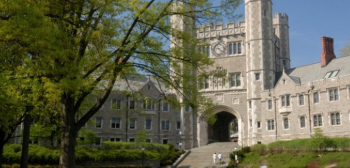- #10 QS Global World Ranking
- Private not for ProfitStatus
- Very HighResearch Output
- 2,463Total Students
- 929Faculty
- 788Int'l Students
The University’s position in the current QS World University Rankings.
Whether the University is funded by the government of that country or state, or funded by private donations.
The research intensity of the University, based on the number of papers output relative to the University’s size.
The number of full time equivalent students enrolled at the University.
The number of full time equivalent teaching staff employed by the University.
The number of full time equivalent international students enrolled at the University.
California Institute of Technology (Caltech)
About
At Caltech there are six academic divisions: biology and biological engineering; chemistry and chemical engineering; engineering and applied science; geological and planetary sciences; humanities and social sciences; and physics, mathematics and astronomy.
There are several graduate programs that fall under each division, with each option supervised by faculty members with closely related interests and research. The graduate student to faculty ratio across all divisions is currently 4:1.
Almost all of the academic divisions offer the degree of Doctor of Philosophy (PhD), and a few offer a master’s degree, though this is awarded only under special circumstances. The most popular subjects are chemistry, physics, biology, electrical engineering and chemical engineering.
Admission to Caltech's graduate school is granted only to a select number of students, with the admission process taking place once a year, for enrollment in the fall. Applicants must have a bachelor's degree and are required to submit degree transcripts, GRE standardized test scores, three letters of recommendation, a resume, and the applicant's statement of purpose. The admissions committee may also consider research papers, publications and other original work.
Candidates should submit their applications as early as possible. Those who already possess a PhD will not be considered, and international candidates whose first language is not English will need to submit IELTS or TOEFL scores, to demonstrate their proficiency in the language. The fee to apply is currently $100.
The cost of a graduate education at Caltech varies. If tuition, mandatory fees, room, board, and utilities are all taken into account then the total cost can be as much as $80,917 a year. However, most graduate students at Caltech receive full funding for their graduate education. In fact, approximately 99 percent of doctoral students have full financial support, which comes in the form of fellowships, research assistantships, teaching assistantships, or a combination of fellowship and assistantship support.
Financial aid is usually awarded on an annual basis and is based on satisfactory academic progress. Caltech is so generous with its financial aid that a separate application for requesting financial aid isn’t even required. The only graduate students who will not receive financial assistance are those taking master’s programs, who in many cases are self-supported.
About
At Caltech there are six academic divisions: biology and biological engineering; chemistry and chemical engineering; engineering and applied science; geological and planetary sciences; humanities and social sciences; and physics, mathematics and astronomy.
There are several graduate programs that fall under each division, with each option supervised by faculty members with closely related interests and research. The graduate student to faculty ratio across all divisions is currently 4:1.
Almost all of the academic divisions offer the degree of Doctor of Philosophy (PhD), and a few offer a master’s degree, though this is awarded only under special circumstances. The most popular subjects are chemistry, physics, biology, electrical engineering and chemical engineering.
Admission to Caltech's graduate school is granted only to a select number of students, with the admission process taking place once a year, for enrollment in the fall. Applicants must have a bachelor's degree and are required to submit degree transcripts, GRE standardized test scores, three letters of recommendation, a resume, and the applicant's statement of purpose. The admissions committee may also consider research papers, publications and other original work.
Candidates should submit their applications as early as possible. Those who already possess a PhD will not be considered, and international candidates whose first language is not English will need to submit IELTS or TOEFL scores, to demonstrate their proficiency in the language. The fee to apply is currently $100.
The cost of a graduate education at Caltech varies. If tuition, mandatory fees, room, board, and utilities are all taken into account then the total cost can be as much as $80,917 a year. However, most graduate students at Caltech receive full funding for their graduate education. In fact, approximately 99 percent of doctoral students have full financial support, which comes in the form of fellowships, research assistantships, teaching assistantships, or a combination of fellowship and assistantship support.
Financial aid is usually awarded on an annual basis and is based on satisfactory academic progress. Caltech is so generous with its financial aid that a separate application for requesting financial aid isn’t even required. The only graduate students who will not receive financial assistance are those taking master’s programs, who in many cases are self-supported.
University highlights
- 2012#10
- 2014#=10
- 2015#8
- 2016#5
- 2017#5
- 2018#4
- 2019#4
- 2020#5
- 2021#4
- 2022#6
- 2023#=6
- 2024#15
- 2025#10
- 2026#10
Campus locations
California Institute of Technology (Caltech),
1200 East California Boulevard , Pasadena , California , United States , 91125
Similar Universities
Temple University
1801 North Broad Street, Philadelphia
651-700 QS World University Rankings 5 QS starsMaryland Institute College of Art
1300 W. Mount Royal Avenue, Baltimore
Rochester Institute of Technology (RIT)
Lomb Memorial Drive, Rochester
ASU - Thunderbird School of Global Management
400 E Van Buren, Phoenix
George Washington University School of Business
George Washington University, Washington D.C.
Seton Hall University
400 S Orange Ave, South Orange, South Orange
Savannah College of Art and Design
516 Drayton St, Savannah
Related content

Top US Universities by State…

Top Engineering Schools in t…

Tuition Fees at the World’s…

Top Universities in the Worl…

Top Universities in the US 2…

Out Now: QS World University…

Why Are International Studen…

Top Universities in Californ…
Test preparations
Featured University


-
10 UG & 47 PGTotal courses
-
Private for ProfitStatus
-
HighResearch output














